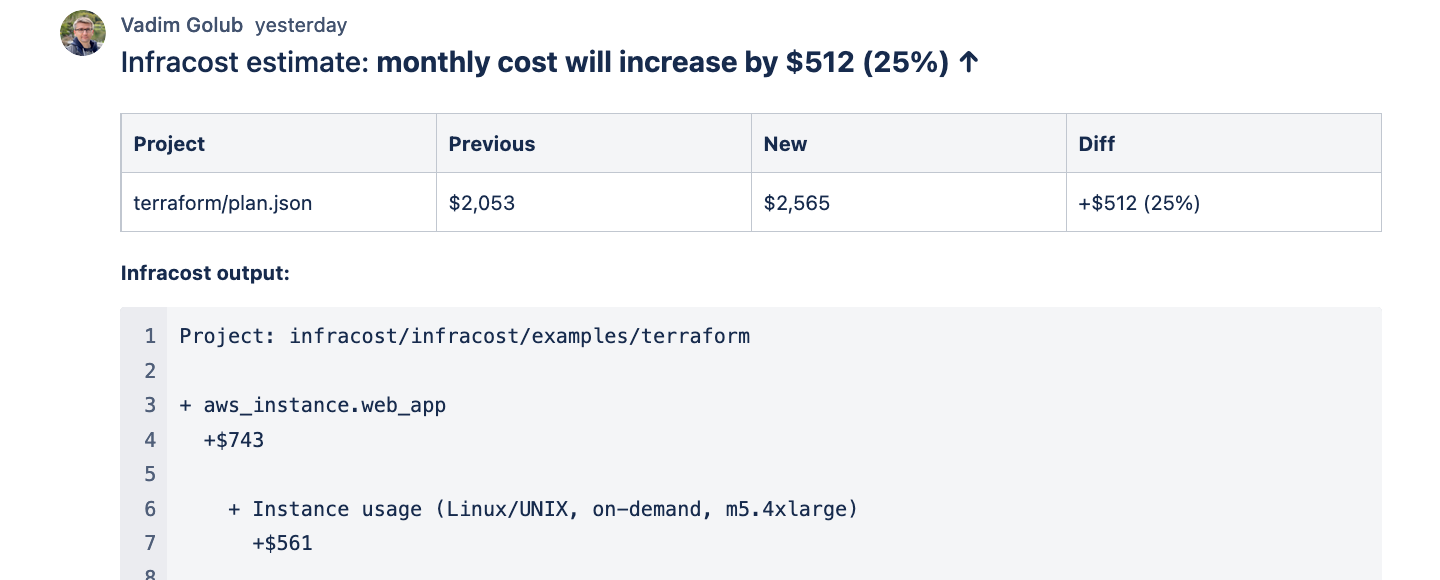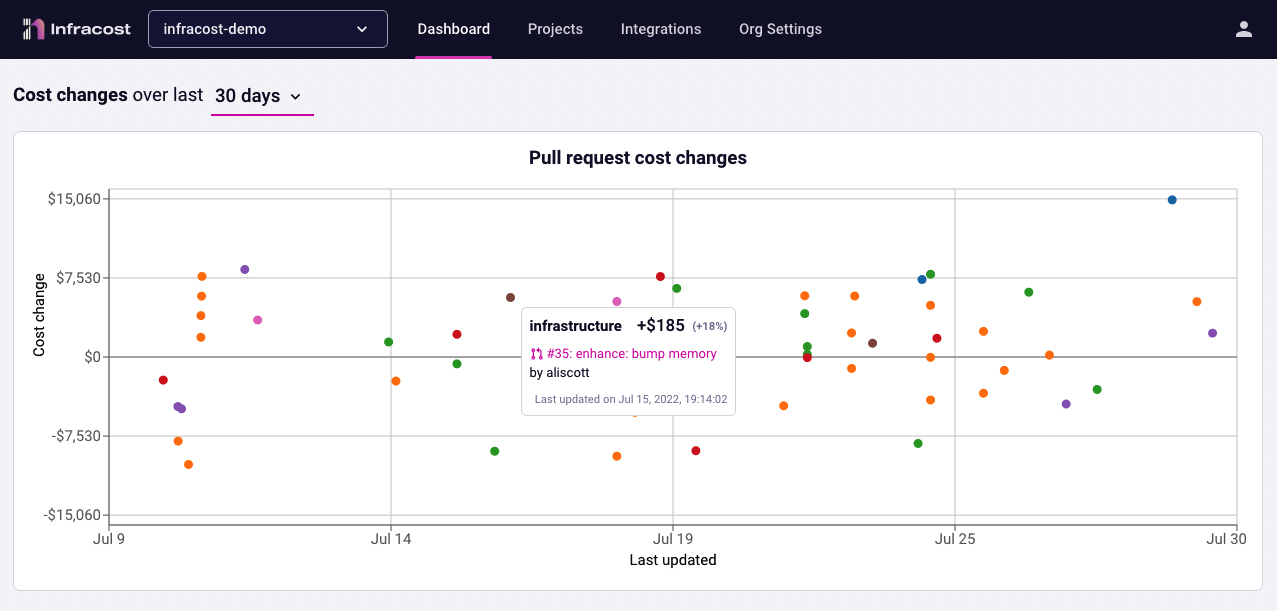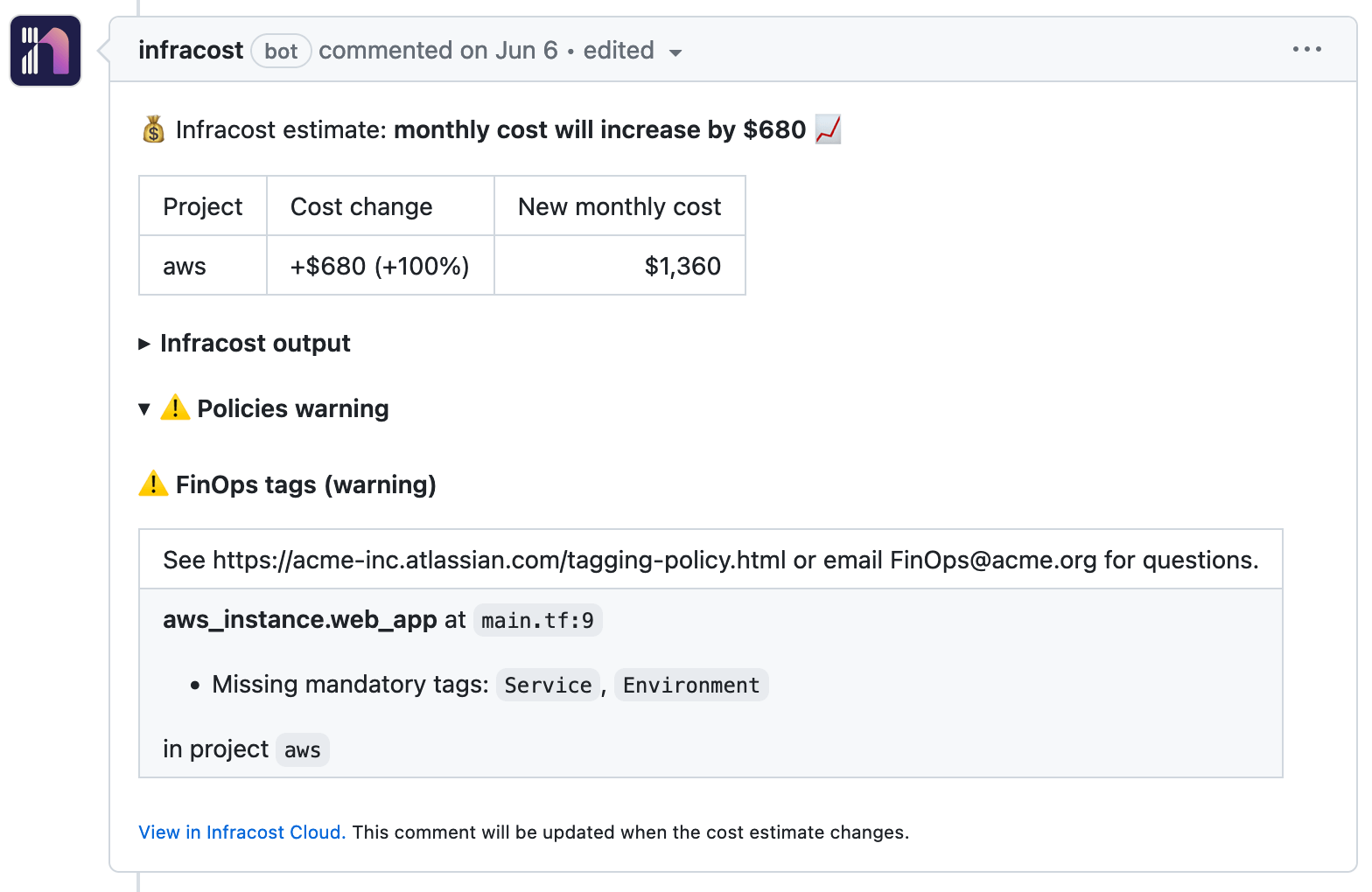This project provides instructions for using Infracost in a CircleCI pipeline, it works with both GitHub and Bitbucket Cloud. This enables you to see cloud cost estimates for Terraform in pull requests. 💰
-
If you haven't done so already, download Infracost and run
infracost auth loginto get a free API key. -
Retrieve your Infracost API key by running
infracost configure get api_key. -
In CircleCI, go to your Project Settings > Environment Variables, and add environment variables for
INFRACOST_API_KEY,GITHUB_TOKEN. -
We recommend you enable CircleCI's "Only build pull requests" option. This setting is in CircleCI's Project > Advanced settings page.
-
Create a new file at
.circleci/config.ymlin your repo with the following content.version: 2.1 jobs: infracost: # Always use the latest 0.10.x version to pick up bug fixes and new resources. # See https://www.infracost.io/docs/integrations/cicd/#docker-images for other options docker: - image: infracost/infracost:ci-0.10 environment: TF_ROOT: terraform # Update this to be your the path to your terraform code! # IMPORTANT: update this to your target branch, e.g. main, master BASE_BRANCH: main # If you use private modules you'll need this env variable to use # the same ssh-agent socket value across all jobs & steps. SSH_AUTH_SOCK: /tmp/ssh_agent.sock # If you're using Terraform Cloud/Enterprise and have variables or private modules stored # on there, specify the following to automatically retrieve the variables: # INFRACOST_TERRAFORM_CLOUD_TOKEN: $TFC_TOKEN # INFRACOST_TERRAFORM_CLOUD_HOST: app.terraform.io # Change this if you're using Terraform Enterprise steps: - run: name: Skip if not pull request command: | if [ "$CIRCLE_PULL_REQUEST" == "" ]; then circleci step halt fi - attach_workspace: at: /tmp - checkout # Clone the base branch of the pull request (e.g. main/master) into a temp directory. - run: name: Checkout base branch command: git clone $CIRCLE_REPOSITORY_URL --branch=$BASE_BRANCH --single-branch /tmp/base # If you use private modules, add an environment variable or secret # called GIT_SSH_KEY with your private key, so Infracost can access # private repositories (similar to how Terraform/Terragrunt does). # - run: # name: add git ssh key # command: | # ssh-agent -a ${SSH_AUTH_SOCK} # mkdir -p ~/.ssh # echo "${GIT_SSH_KEY}" | tr -d '\r' | ssh-add - # # Update this to github.com, gitlab.com, bitbucket.org, ssh.dev.azure.com or your source control server's domain # ssh-keyscan github.com >> ~/.ssh/known_hosts # Generate Infracost JSON file as the baseline. - run: name: Generate Infracost cost estimate baseline command: | infracost breakdown --path=/tmp/base \ --format=json \ --out-file=/tmp/infracost-base.json # Generate an Infracost diff and save it to a JSON file. - run: name: Generate Infracost diff command: | infracost diff --path=${TF_ROOT} \ --format=json \ --compare-to=/tmp/infracost-base.json \ --out-file=/tmp/infracost.json # Posts a comment to the PR using the 'update' behavior. # This creates a single comment and updates it. The "quietest" option. # The other valid behaviors are: # delete-and-new - Delete previous comments and create a new one. # hide-and-new - Minimize previous comments and create a new one. # new - Create a new cost estimate comment on every push. # See https://www.infracost.io/docs/features/cli_commands/#comment-on-pull-requests for other options. - run: name: Post Infracost comment command: | # Extract the PR number from the PR URL PULL_REQUEST_NUMBER=${CIRCLE_PULL_REQUEST##*/} infracost comment github --path=/tmp/infracost.json \ --repo=$CIRCLE_PROJECT_USERNAME/$CIRCLE_PROJECT_REPONAME \ --pull-request=$PULL_REQUEST_NUMBER \ --github-token=$GITHUB_TOKEN \ --behavior=update workflows: infracost: jobs: - infracost
-
🎉 That's it! Send a new pull request to change something in Terraform that costs money. You should see a pull request comment that gets updated, e.g. the 📉 and 📈 emojis will update as changes are pushed!
If there are issues, check the GitHub Actions logs and this page.

-
In Infracost Cloud, go to Org Settings and enable the dashboard, then trigger your CI/CD pipeline again. This causes the CLI to send its JSON output to your dashboard; the JSON does not contain any cloud credentials or secrets, see the FAQ for more information.
This is our SaaS product that builds on top of Infracost open source. It enables team leads, managers and FinOps practitioners to setup tagging policies, guardrails and best practices to help guide the team. For example, you can check for required tag keys/values, or suggest switching AWS GP2 volumes to GP3 as they are more performant and cheaper.
-
If you haven't done so already, download Infracost and run
infracost auth loginto get a free API key. -
Retrieve your Infracost API key by running
infracost configure get api_key. -
In CircleCI, go to your Project Settings > Environment Variables, and add environment variables for
INFRACOST_API_KEY,BITBUCKET_TOKEN. -
We recommend you enable CircleCI's "Only build pull requests" option. This setting is in CircleCI's Project > Advanced settings page.
-
Create a new file at
.circleci/config.ymlin your repo with the following content.version: 2.1 jobs: infracost: # Always use the latest 0.10.x version to pick up bug fixes and new resources. # See https://www.infracost.io/docs/integrations/cicd/#docker-images for other options docker: - image: infracost/infracost:ci-0.10 environment: TF_ROOT: terraform # Update this to be your the path to your terraform code! # IMPORTANT: update this to your target branch, e.g. main, master BASE_BRANCH: main # If you use private modules you'll need this env variable to use # the same ssh-agent socket value across all jobs & steps. SSH_AUTH_SOCK: /tmp/ssh_agent.sock # If you're using Terraform Cloud/Enterprise and have variables or private modules stored # on there, specify the following to automatically retrieve the variables: # INFRACOST_TERRAFORM_CLOUD_TOKEN: $TFC_TOKEN # INFRACOST_TERRAFORM_CLOUD_HOST: app.terraform.io # Change this if you're using Terraform Enterprise steps: - run: name: Skip if not pull request command: | if [ "$CIRCLE_PULL_REQUEST" == "" ]; then circleci step halt fi - attach_workspace: at: /tmp - checkout # Clone the base branch of the pull request (e.g. main/master) into a temp directory. - run: name: Checkout base branch command: git clone $CIRCLE_REPOSITORY_URL --branch=$BASE_BRANCH --single-branch /tmp/base # If you use private modules, add an environment variable or secret # called GIT_SSH_KEY with your private key, so Infracost can access # private repositories (similar to how Terraform/Terragrunt does). # - run: # name: add git ssh key # command: | # ssh-agent -a ${SSH_AUTH_SOCK} # mkdir -p ~/.ssh # echo "${GIT_SSH_KEY}" | tr -d '\r' | ssh-add - # # Update this to github.com, gitlab.com, bitbucket.org, ssh.dev.azure.com or your source control server's domain # ssh-keyscan bitbucket.org >> ~/.ssh/known_hosts # Generate Infracost JSON file as the baseline. - run: name: Generate Infracost cost estimate baseline command: | infracost breakdown --path=/tmp/base/${TF_ROOT} \ --format=json \ --out-file=/tmp/infracost-base.json # Generate an Infracost diff and save it to a JSON file. - run: name: Generate Infracost diff command: | infracost diff --path=${TF_ROOT} \ --format=json \ --compare-to=/tmp/infracost-base.json \ --out-file=/tmp/infracost.json # Posts a comment to the PR using the 'update' behavior. # This creates a single comment and updates it. The "quietest" option. # The other valid behaviors are: # delete-and-new - Delete previous comments and create a new one. # new - Create a new cost estimate comment on every push. # See https://www.infracost.io/docs/features/cli_commands/#comment-on-pull-requests for other options. - run: name: Post Infracost comment command: | # Extract the PR number from the PR URL PULL_REQUEST_NUMBER=$(echo "$CIRCLE_PULL_REQUEST" | sed 's/.*pull-requests\///') infracost comment bitbucket --path=/tmp/infracost.json \ --repo=$CIRCLE_PROJECT_USERNAME/$CIRCLE_PROJECT_REPONAME \ --pull-request=$PULL_REQUEST_NUMBER \ --bitbucket-token $BITBUCKET_TOKEN \ --behavior=update workflows: infracost: jobs: - infracost
-
🎉 That's it! Send a new pull request to change something in Terraform that costs money. You should see a pull request comment that gets updated, e.g. the '↑' and '↓' characters will update as changes are pushed!

-
In Infracost Cloud, go to Org Settings and enable the dashboard, then trigger your CI/CD pipeline again. This causes the CLI to send its JSON output to your dashboard; the JSON does not contain any cloud credentials or secrets, see the FAQ for more information.
This is our SaaS product that builds on top of Infracost open source. It enables team leads, managers and FinOps practitioners to setup tagging policies, guardrails and best practices to help guide the team. For example, you can check for required tag keys/values, or suggest switching AWS GP2 volumes to GP3 as they are more performant and cheaper.
Run infracost comment github --help or infracost comment bitbucket --help to see the the full list of options or see our docs.
We don't yet have examples for different use cases with Infracost for CircleCI, but we do have a selection of examples for GitLab that can be modified to work with CircleCI.
Issues and pull requests are welcome. Please create issues in this repo or join our community Slack slack, we are a friendly bunch and happy to help you get started :)



